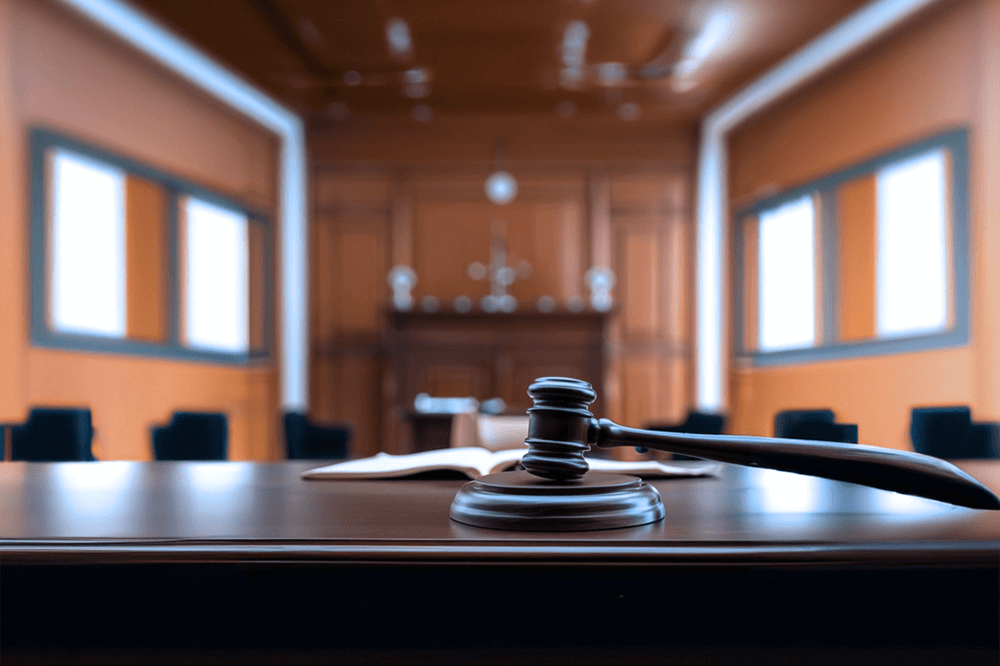
The General Panel of the Court of Cassation in Abu Dhabi Unanimously Decides to Overturn Its Established Judicial Principle That “Legal Proceedings Can Only Be Initiated Between Living Persons” and Permits the Correction of a Lawsuit or Appeal Filed Against a Deceased Person by Summoning Their Heirs Before the Same Level of Litigation.
- Home
- Blog Standard
- Insights & News
- The General Panel of the Court of Cassation in Abu Dhabi Unanimously Decides to Overturn Its Established Judicial Principle That “Legal Proceedings Can Only Be Initiated Between Living Persons” and Permits the Correction of a Lawsuit or Appeal Filed Against a Deceased Person by Summoning Their Heirs Before the Same Level of Litigation.
Background:
1- The plaintiff (our client) filed commercial lawsuit No. 546/2023 before the Abu Dhabi Court of First Instance against the defendant, seeking the termination of the partnership agreement concluded between them and compelling the defendant to pay AED 30 million, along with AED 1.5 million in compensation. Such claims were based on the defendant’s breach of their agreement to establish a medical company with a capital of AED 60 million, wherein each party was to contribute 50%. However, the defendant registered the company solely in his name, excluding the plaintiff, which constituted a fundamental breach warranting the termination of the contract, restitution of received funds, and compensation. The plaintiff also requested the consolidation of the precautionary attachment file filed against the defendant.
2- The attorney of the defendant’s heirs appeared before the court and informed the court of the defendant’s death, requesting the dismissal of the lawsuit and the annulment of all legal proceedings, as the lawsuit had been filed against a deceased person whose death had occurred prior to the filing of the case.
3- The court joined the Public Prosecution to the case due to the presence of minor heirs. The Public Prosecution submitted a memorandum in which it left the matter to the court’s discretion.
4- The plaintiff responded to the plea of nullity raised on the grounds that the lawsuit was filed against a deceased person, arguing as follows: That immediately upon learning of the defendant’s death, the plaintiff corrected the lawsuit’s form before taking any legal action. As a result, a new legal dispute was effectively established between the plaintiff and the defendant’s heirs. The purpose of nullifying legal proceedings initiated against a deceased person is to prevent the continuation of proceedings without the heirs’ knowledge, which could lead to a judgment being issued without giving them the opportunity to defend their rights. Article 13(2) of the Federal Civil Procedure Law No. 42 of 2022 states: “In all cases, the invalidity shall not be decided in spite of being provided for in the law, if the purpose of the underlying procedure is achieved”. Since the plaintiff, in good faith, summoned the heirs and corrected the lawsuit’s form, ensuring that they were properly notified and able to respond before the same level of litigation, the intended purpose was achieved. Articles 105 and 106 of the Federal Civil Procedure Law provide that legal proceedings are interrupted upon a party’s death, but the lawsuit resumes upon notification of the heirs. Accordingly, if a lawsuit can be resumed by notifying the heirs, then it is even more justifiable that the proceedings continue when the lawsuit is directly corrected and the heirs are notified accordingly.
5- The Court of First Instance ruled to correct the lawsuit’s form, substituting the defendant’s heirs in his place, terminate the contract between the plaintiff and the deceased defendant and order the heirs to pay the plaintiff AED 31 million, within the limits of the estate inherited from their predecessor.
6- The heirs appealed the judgment through Commercial Appeal No. 2472/2023, but the Court of Appeal upheld the lower court’s ruling.

Judgment of the Abu Dhabi Court of Cassation
The heirs challenged the judgment before the Abu Dhabi Court of Cassation under Commercial Cassation Appeal No. 40/2024. The Court of Cassation ruled: “It has been well established in the jurisprudence of this Court, as per the rulings issued in Cassation Appeals No. 187 of 2016 (dated 28/03/2016), No. 996 of 2021 (dated 01/11/2021), No. 4701 and No. 1086 of 2021 (dated 22/11/2021), No. 250 and No. 282 of 2023 (dated 04/05/2023), and other commercial cassation judgments from Abu Dhabi, that the defendant shall possess the capacity to be sued and procedural capacity, which requires them to be alive at the time the lawsuit is filed against them. If it is established that the defendant was deceased before the lawsuit was filed, the litigation against them is deemed non-existent and cannot be rectified later by summoning their heirs through a procedural correction of the lawsuit’s form. This is because legal proceedings can only be initiated between living persons. If there are multiple defendants and the subject matter is divisible, and if their inclusion in the lawsuit is not mandatory, then the invalidity affects only the deceased defendant. However, if the subject matter is indivisible, or if the joinder of all defendants is mandatory under the applicable substantive law, then the entire lawsuit or appeal is deemed void with respect to all appellees. Moreover, the appellant’s lack of knowledge of the defendant’s death does not constitute a valid excuse to prevent a ruling of nullity, as the litigation is considered non-existent from the outset. It is the plaintiff’s responsibility to monitor any changes in the status, capacity, or condition of the opposing party before filing an appeal.
The Court of Cassation, however, decided to overturn this established precedent and adopt a different legal principle, permitting the inclusion of a deceased person’s heirs before initiating legal proceedings or filing an appeal before the Court of Appeal or Court of Cassation through a new lawsuit filed with the Case Management Office, fully complying with all legal requirements. The Court ordered the referral of the appeal to the General Panel of the Court of Cassation for a final decision.
Judgment of the General Panel of the Abu Dhabi Court of Cassation
1- On 26/02/2023, the General Panel for Civil, Commercial and Personal Status Matters of the Abu Dhabi Court of Cassation held a public hearing session in Cassation Appeal No. 40/2024 (registered under General Panel No. 1/2024), in accordance with Article 10 (3) bis of Law No. 23 of 2006 regarding the Abu Dhabi Judicial Department, as amended by Law No. 13 of 2018. The hearing session was convened to overturn a previously established judicial precedent, which had held that a defendant shall have the capacity to be sued and procedural capacity, requiring them to be alive at the time the lawsuit is filed against them. If it was established that the defendant had passed away before the lawsuit was filed, the litigation against them was deemed null and could not be rectified by later summoning their heirs through a procedural correction of the lawsuit’s form. However, the Court unanimously decided to establish a new principle, permitting the correction of the form of a lawsuit or appeal initially filed against a deceased person by summoning their heirs—before the same level of litigation—through a memorandum or a new statement of claim submitted to the Case Management Office. This ruling was based on the principle that the core objective of legal proceedings is ensuring confrontation between parties, aligning with the legislator’s procedural approach of prioritizing the validity of legal actions over grounds for nullity, as the procedural laws shall serve as a flexible tool for accessible and secure justice, avoiding excessive formalism. The legislator has also ensured that judges have the discretion to prioritize procedural validity over nullity when the intended purpose of the procedure is achieved. The Court further stated: “Whereas, the respondent corrected the form of the initial lawsuit by summoning the heirs of the first defendant, and whereas the heirs appeared through their legal representative after this correction, ensuring the principle of confrontation between the litigants, the proceedings—after the correction of the lawsuit—are deemed valid and properly constituted.”
2- On 20/03/2024, the General Panel ruled: “To establish the judicial principle that permits the correction of the form of a lawsuit or appeal by summoning the heirs of a deceased person—before the same level of litigation—if their death is established before the lawsuit is filed or before the appeal statement is submitted to the Court of Appeal or Court of Cassation, provided that a memorandum or a new statement of claim is submitted to the Case Management Office, fully meeting all legal requirements within the prescribed time limits.”
Conclusion:
1- The rationale behind ruling the absence of a dispute brought against a person who died before the lawsuit or appeal was filed is the necessity to uphold the principle of confrontation between litigants and safeguard the defense rights of each, ensuring the achievement of justice among them. This is the supreme goal sought by all procedural and substantive laws alike. However, this rationale is negated when the heirs are involved after the lawsuit or appeal is filed but before the issuance of a judgment terminating the dispute, and they are enabled to present their defenses. Therefore, departing from previous principles and adopting the principle that permits the inclusion of the deceased’s heirs is legally sound and correct.
2- Summoning the heirs of a deceased person who passed away before the lawsuit or appeal was filed, through a valid subsequent procedure before the same level of litigation, even if the correction is made after the appeal deadlines have expired, rectifies the procedural defect that initially affected the litigation process. Therefore, there is no basis to rule that the litigation is null and void due to this reason.
3- The new principle established by the General Assembly aligns with Article (106) of the UAE Federal Civil Procedure Law of 2022. In cases where a party passes away during the litigation process, the proceedings are suspended and later resumed after a summons is issued to the heirs or their legal representatives. By the same logic, litigation should continue if a party passes away before the lawsuit is initiated, provided that the opposing party corrects the lawsuit’s form and summons the heirs before the same level of litigation.
4- The General Panel of the Dubai Court of Cassation, in Appeal No. 3 of 2023, ruled on 31/10/2023 in favor of the same principle, marking a positive judicial trend where all courts of law follow a unified approach on this matter.
Subscribe Newsletter
Sign up to receive notifications about the latest news and events from us!
x
Contact Us!
Abu Dhabi: 2nd Floor, SJ Tower, 18th Street, Abu Dhabi.
Dubai: Office 1610, 16th Floor, Iris Bay Tower, Business Bay, Al Mustaqbal St.
Mail: [email protected]
Mon – Fri: 8.00am – 18.00pm / Sat & Sunday : Closed
x









